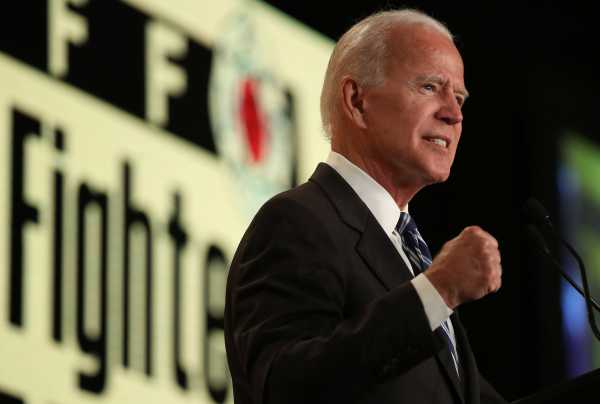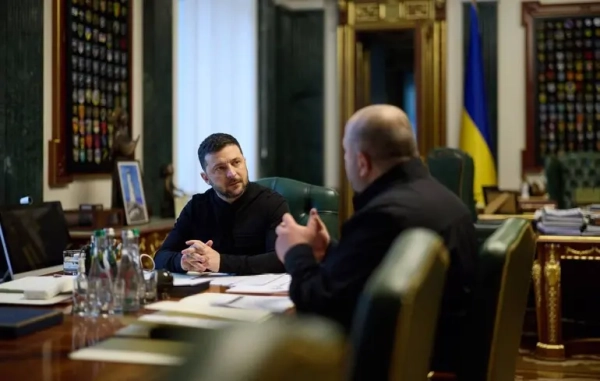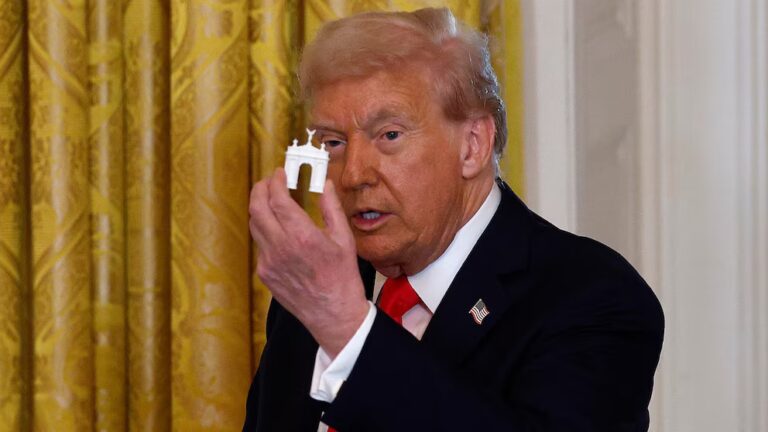
Joe Biden still has “regret” about the way he handled Anita Hill’s testimony in 1991, ahead of his expected announcement to run for the Democratic nomination for president.
“I wish I could have done something — I opposed Clarence Thomas’ nomination, and I voted against him,” he said, during Tuesday night’s Biden Courage Awards, an event co-hosted with It’s On Us, a campus sexual assault prevention organization. “But I also realized that there was a real and perceived problem the Committee faced: There were a bunch of white guys.”
Biden was the Senate Judiciary chair when Hill brought allegations that then-Supreme Court nominee Clarence Thomas sexually harassed her at two different jobs. At the time, he was in charge of overseeing how Hill’s testimony was presented to senators before they decided to confirm Thomas to the Supreme Court. Thomas denied all the allegations.
Especially in the wake of hearings in which Christine Blasey Ford accused now-Supreme Court Justice Brett Kavanaugh of sexual assault, the failures of the process women must take to testify about their experiences in the modern era have reopened questions about Biden’s handling of the Hill hearings. (Kavanaugh has also denied all allegations of wrongdoing.) Like the Ford hearing, Hill’s was confrontational — and in 1991, the all-white, all-male committee openly questioned her credibility.
Biden has been criticized not just for the hearing’s tenor, but also for its structure and his refusal to bring forth additional witnesses who could have substantiated Hill’s allegations.
Biden added during the Tuesday event that he had publicly apologized to Hill about the way she was treated by the Senate committee, but made no mention of whether he had directly called her to do so. “To this day, I regret that I could not come up with a way to get her the kind of hearing she deserved, given the courage she showed by reaching out to us,” he said. (As of last fall, Hill said she had not received a direct apology from Biden and that the “statute of limitations” had run out.)
Biden’s remarks sought to tackle his involvement in the hearings directly, but they also contained some notable omissions: By saying he “wish[es]” he could have done something, he failed to confront his own culpability on the issue and the power he had at the time as committee chair. It’s a public framing that seems to echo a line he’s walked in private, according to the New York Times: While Biden has expressed regrets about the Thomas hearings, he’s complained privately about the blame he’s received for events he largely sees as out of his control.
A spokesperson for Biden’s campaign declined to comment further. Hill did not immediately respond to a request for comment.
For women voters and people of color, both key members of the Democratic base, there are still some outstanding questions for Biden — ones he’ll likely have to address more directly if he jumps into the race.
“I think people want an answer for what happened,” said Kelly Dittmar, an assistant political science professor at Rutgers and scholar at the Center for American Women and Politics. “Like, why weren’t all the witnesses brought? Why didn’t he step in to advocate more forcefully on behalf of Anita Hill?”
According to a Morning Consult/Politico poll released this week, this baggage is something that could drag Biden down and could even be disqualifying for his candidacy for some Democratic voters.
Twenty-eight percent of Democratic women disapprove of how Biden handled the Hill testimony and 29 percent of African American voters feel the same. Fourteen percent of Democratic women also said they could be less likely to vote for Biden in a Democratic primary because of his past efforts on this front, and 20 percent of African American voters expressed this perspective.
Biden has been hounded by his role in the Thomas confirmation hearings every time he’s floated a presidential bid in recent cycles and faced even more criticism after the Kavanaugh confirmation hearings last fall. If he jumps into the 2020 race, it’s a question he’ll surely have to keep on fielding.
The critiques against Joe Biden — and how he’s responded
There are two main points on which Biden has been criticized when it comes to the Thomas hearings: Activists have said he could have done more to shield Hill from Republican attacks as the head of the Judiciary Committee and that he could have structured the hearings more fairly. (Biden allowed Thomas to testify before and after Hill did, and did not call upon three women who could have testified about their own experiences with Thomas and office culture.)
During the hearing, Hill described a pattern of harassment, the New York Times’s Julia Jacobs writes:
In response to her allegations, the 14 all-white, all-male members of the Senate Judiciary Committee grilled her relentlessly, with several Republicans openly seeking to discredit her and even accusing her of “erotomania.” Senators targeted Hill on everything from the specifics of her allegations to the reliability of her testimony.
In one instance, Republican Sen. Arlen Specter appeared to argue that inappropriate comments Thomas made to Hill about women’s “breasts” were commonplace, while in another Sen. Orrin Hatch (R-UT) suggested that she made up allegations based on prose featured in the book, The Exorcist.
While every lawmaker on the committee had his own dedicated time to ask questions, Hill supporters noted that Biden was the one overseeing all of the proceedings and could have used his authority to step in. “The Republicans metaphorically stoned Anita Hill, while the Democrats, Biden being the gatekeeper, let it happen,” Angela Wright Shannon, an EEOC employee who also raised allegations against Thomas, told Roll Call.
Hill’s camp also notes that Biden contributed to the hostile tone of the hearing himself. “I was shocked and dismayed that Joe Biden was asking questions that didn’t seem appropriate and was not in her corner as a Democrat,” Charles Ogletree, a Harvard law professor who served as Hill’s attorney, told Politico. “The point is that he’s supposed to be neutral, but his questions to Anita Hill were as piercing as anyone’s.”
Biden has argued that the rules governing the committee limited how much he was able to intervene, especially when questions were being asked by other lawmakers.
“My one regret is that I wasn’t able to tone down the attacks on her by some of my Republican friends. I mean, they really went after her,” he told Teen Vogue’s Elaine Welteroth in a 2017 interview. “As much as I tried to intervene, I did not have the power to gavel them out of order. I tried to be like a judge and only allow a question that would be relevant to ask.”
Biden has also been criticized for not calling more witnesses who could have helped corroborate Hill’s account. Sukari Hardnett and Wright Shannon were both EEOC employees who said they could speak to the culture of the office. Wright Shannon had also brought allegations of harassment against Thomas as well. Both were not ultimately called to testify, nor was at least one other woman who said she could back Hill’s allegations.
“I did expect that the chair would be fair and gather the testimony from the relevant witnesses, like the three women who were not called in to testify, like the experts on sexual harassment that could have helped inform the committee about how the problem manifests itself,” Hill told Time in 2016.
Biden has since said that he was interested in including the testimony of additional witnesses but that several wound up declining to take the stand. “I wasn’t able to convince three women we’d subpoenaed to cooperate with testimony,” he said in the Teen Vogue interview. “At the last minute, they changed their mind and said they wouldn’t do it. I had them sign an affidavit saying, ‘I want you to come, and you’re saying, ‘No, I will not come.’ In retrospect, some, including Anita, think I should have subpoenaed them no matter what.”
Interestingly, it’s also unclear if Biden has personally reached out to Hill to express contrition, after making numerous public remarks on the matter. Hill has said she is done waiting for Biden’s personal apology, in an interview with Elle magazine in 2018:
Biden will have to answer for the Hill hearings, but it may not kill his candidacy
Biden’s actions related to Hill’s testimony will be a key part of his past that he’ll need to deal with if he decides to join the 2020 campaign. Women, especially, were so outraged by the way that Hill was treated in 1991 that a historic surge of women wound up running for office in 1992, spurring the first “Year of the Woman.”
“We need to remember that for many cohorts of women, those televised hearings were formative. For me, as a young college student in my dorm, all of us gathered and watched, horrified and angry, our consciousnesses awakening and strengthening,” said Tracy Sefl, a Democratic strategist who previously served as an adviser on Hillary Clinton’s presidential campaign. “That’s not a memory many forget.”
Hill, in 2002, also raised the racism at play in the way that she was ultimately treated by the committee and the press. “How do you think certain people would have reacted if I had come forward and been white, blond-haired and blue-eyed?” she said at the time.
Experts say Biden’s best bet to fully put this blowback behind him will be to be as direct as possible — and to actually address his failings on the subject instead of evading them.
“If Anita Hill believes she’s owed an apology, then she’s owed an apology, without question. And he should give one,” Patti Solis Doyle, a strategist who also previously served as Biden’s 2008 campaign chief of staff, told Politico. “Certainly, Joe Biden did not do the harassing. Joe Biden ended up voting against Clarence Thomas. But what was done to Anita Hill in those hearings … it was unseemly. And as chair of the Judiciary back then, he probably should have taken a bigger role in making Anita Hill feel safe and comfortable, and clearly, she did not feel that way.”
Many voters may not hold Biden’s handling of Hill’s testimony against him — he’s currently leading the Democratic field with 35 percent of voters’ support — but he’ll still have to be open on the subject to win over the ones who do.
Across all self-identified Democrats in the Morning Consult/Politico poll, 30 percent of voters said they disapproved of how Biden handled Hill’s testimony and 44 percent said they didn’t know or had no opinion on the matter. Seventeen percent of Democrats said his handling of her testimony could make it less likely that they would vote for him.
“Women voters who like his work on legislation such as protecting women’s right to abortion and clinics that perform abortion might not remember the Anita Hill controversy or discount it,” said University of Pennsylvania history professor Mary Frances Berry, and former head of the US Commission on Civil Rights. “Those who do remember it along with his protection of school segregation in Delaware, for example, will probably reject his candidacy.”
“Biden can keep apologizing to Anita Hill, and plead with the public for forgiveness,” Berry added.
Sourse: vox.com






